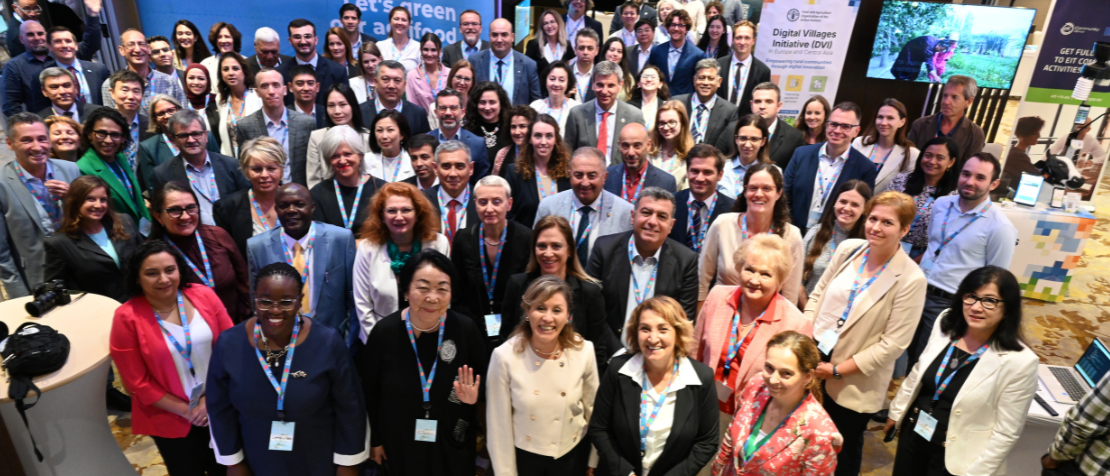From Budapest to the world: Cultivate change, harvest hope
FAO convenes Global Forum on Green Agriculture and second Regional Science and Innovation Week
.png?sfvrsn=7573230_3)
©FAO/Mátyás Temesfői
Climate shocks, biodiversity loss and rising food insecurity continue to challenge communities worldwide. Innovative and sustainable solutions are needed more than ever to turn the tide on these negative trends.
It was to this end that the Food and Agriculture Organization of the United Nations (FAO) convened the first Global Forum on Green Agriculture and the Second Regional Science and Innovation Week for Europe and Central Asia from 9 to 11 September 2025 in Budapest, Hungary.
The events brought together over 130 participants in person and around 100 online from every continent to share innovative ideas, lessons learned and perspectives on green agricultural policies and to advance science-driven strategies for transforming agrifood systems.
Capitalizing on 80 years of FAO’s service to countries, the event engaged various sectors and generations to jointly explore a better future of agrifood systems across the globe and identify a sustainable pathway leading there.
The Global Forum on Green Agriculture built on FAO’s Regional Technical Platform on Green Agriculture, launched in 2022 by the Organization’s Europe and Central Asia office. Initially created to share best practices across the region, the platform became a testing ground for climate-smart and sustainable farming.
“Now, by connecting regions, we are scaling up solutions that work with over 100 green practices collected around the world – from innovative technologies to inclusive green policies to nature-based solutions – and giving countries a space to learn from one another,” said Viorel Gutu, FAO Assistant Director-General and Regional Representative for Europe and Central Asia.
A global exchange of policies and practices
The forum opened with the launch of FAO’s first interregional Green Agricultural Policy Assessments, which identified shared priorities across countries: ensuring food security, strengthening water management, advancing climate adaptation and protecting biodiversity.
Governments illustrated these themes with experiences from across the world. From China and Hungary came examples of how digital tools can reshape farming. Armenia and Georgia highlighted progress in organic agriculture. Tunisia described soil and water conservation efforts, and Jordan presented advances in water efficiency. Egypt shared lessons from fisheries and food loss reduction, while Chile and Costa Rica showcased national strategies on carbon neutrality and climate-resilient agriculture.
Regional perspectives highlighted both progress and challenges, from digitalization in Europe and Central Asia to soil and water efficiency in the Near East and North Africa and policy innovation and climate finance in Latin America and the Caribbean. Asia and the Pacific emphasized inclusive, data-driven policies, while African delegates called for green agriculture rooted in national priorities and scaled through partnerships.
Science and innovation at the centre
Building on these policy discussions, attention turned to science and innovation as drivers of change. The FAO Office of Innovation opened with a call for bold thinking, followed by UNESCO’s presentation of the International Decade of Sciences for Sustainable Development as a platform for global collaboration.
A moving youth address urged participants to act with urgency and integrity.
“The future is not something to be saved one day; it is being shaped every minute of the present,” said Tania Santivanez, Agricultural Officer in the FAO Regional Office for Europe and Central Asia. “Science and innovation are the strongest resources we have, but they must be deployed with integrity. Let us dare to talk about limits, about mistakes and about what truly blocks us from progress. Let us show the current and next generation not just ambitions but accountability.”
Throughout the day, dialogues focused on emerging technologies such as artificial intelligence and digital tools, inclusive and people-centred innovations, and systemic approaches to governance and finance. The private sector also took the stage, presenting new initiatives already shaping the greening of agrifood systems.
The forum concluded with hands-on exposure to Hungary’s green agriculture leadership. Delegates visited the Institute of Agricultural Economics in Budapest, where data-driven policy support is shaping decision-making. A field trip to Bugac offered a glimpse of traditional organic farming, demonstrating how sustainability can go hand in hand with cultural heritage and community livelihoods.

©FAO/Mátyás Temesfői
